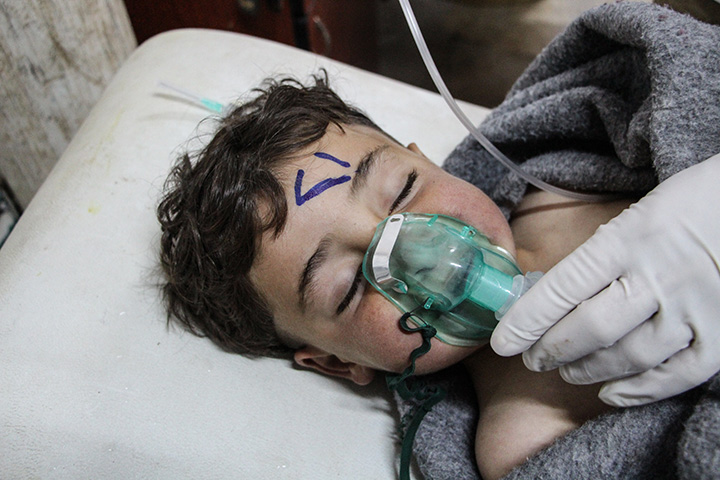THE HAGUE, Netherlands – The chief of the international chemical weapons watchdog said on Friday that he has a team of experts ready and willing to travel to the site of this month’s deadly nerve gas incident in Syria if their safety can be assured.

“We are willing to go to Khan Sheikhoun and we have undertaken some actions,” Ahmet Uzumcu of the Organization for the Prohibition of Chemical Weapons told a small group of reporters in The Hague.
Syrian ally Russia has called for an international investigation into the April 4 attack that killed nearly 90 people. Kremlin spokesman Dmitry Peskov this week expressed regret that the OPCW turned down the Syrian government’s offers to visit the site of the attack and investigate. Russia has rejected Western accusations that Syrian President Bashar Assad’s government was behind the attack.
Uzumcu said that the area of the town of Khan Sheikhoun where the incident happened is controlled by opposition rebels, adding that the watchdog experts will “need to strike some deals with them,” such as a temporary ceasefire, to assure the team’s safety before it can deploy.
WATCH: Dozens killed in suspected chemical weapons attack in Syria

The OPCW has been extremely cautious about sending investigators to Syria since a team of its experts came under attack there in 2014. Uzumcu said the organization is in daily contact with U.N. authorities over the security situation in Syria.
The Syrian president has categorically rejected accusations that his forces were behind the attack, calling the incident an attempt to frame the Syrian government.
In an interview with Telesur network published Thursday, Assad said his government insists on an investigation.
“We and our Russian and Iranian allies are trying to persuade OPCW to send a team to investigate what happened, because if it doesn’t, the United States might repeat the same charade by fabricating the use of false chemical weapons in another place in Syria in order to justify military intervention,” he said.
The Trump administration fired 59 cruise missiles at a Syrian air base in central Syria in the wake of the attack, marking the first time the U.S. has directly struck Assad’s forces during the country’s six-year civil war.
WATCH: Trump doubles down on blaming Obama for Syria chemical attack

Uzumcu is not yet calling the April 4 incident a chemical weapons attack, but he has said that tests by his organization have established beyond doubt that sarin or a similar toxin was used.
Other nations, however, have already labelled it an attack and blamed the Syrian government.
French Foreign Minister Jean-Marc Ayrault said earlier this week that the attack “bears the signature” of Assad’s government and shows it was responsible. Ayrault said France reached the conclusion after comparing samples from a 2013 sarin attack in Syria that matched the new ones.
Environmental samples, the French ministry said, show the weapons were made “according to the same production process as the one used in the sarin attack perpetrated by the Syrian regime in Saraqeb” on April 29, 2013.
Ayrault said French intelligence showed that only Syrian government forces could have launched such an attack — by a bomber taking off from the Shayrat air base, which was later targeted in a retaliatory U.S. missile strike after Washington also blamed Assad’s forces.
Uzumcu said his organization is not yet in a position to confirm the French findings.
The OPCW’s team is already gathering evidence from victims and survivors and testing samples outside Syria. Uzumcu said he expects an initial report to be issued in about 10 days. The initial OPCW investigation will not apportion blame — that is left to a separate investigative mechanism made up of OPCW and U.N. experts.
Uzumcu, who was speaking a day before the OPCW’s 20th anniversary, said his organization has received reports of 45 possible chemical weapons attacks in Syria since 2016.
He also warned of the possibility of foreigners fighting with extremist organizations such as the Islamic State group in Syria and Iraq returning home and taking with them the “know-how” on the development and use of chemical weapons.
In Syria, fighting continued in several areas across the country with airstrikes reported in the opposition-controlled northern Syrian province of Idlib.
International aid organization Save the Children reported that a maternity hospital it supports in Idlib was damaged after at least two airstrikes landed near the facility late Thursday. Patients and staff were evacuated to a basement, it said.
The statement said the incident is the twelfth of a series of attacks against health facilities in April alone.



Comments